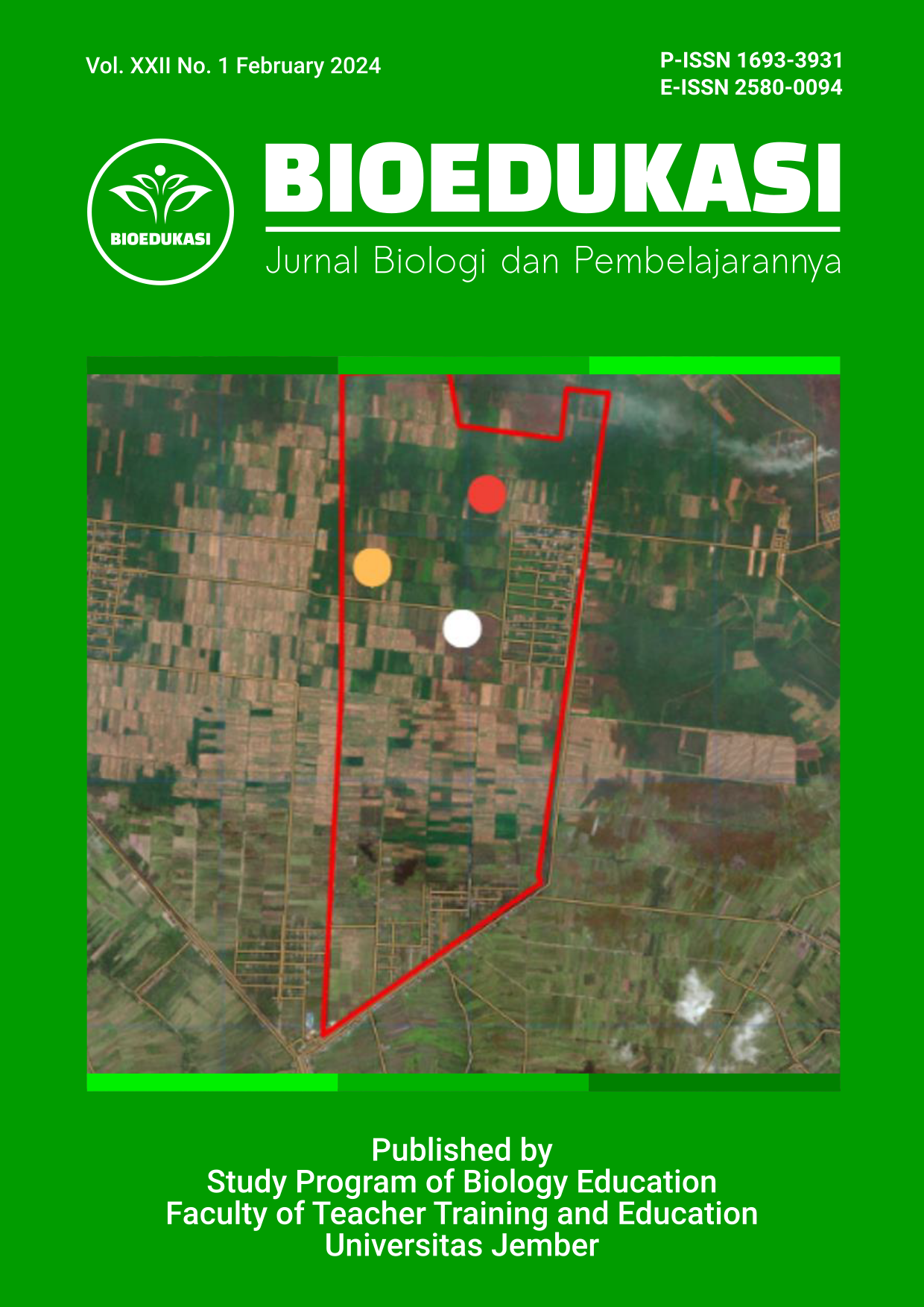Effectiveness of Advanced Technology and Engineering in Biology Learning Model for SDGs in Changing Student’s Conservation Perceptions about Phytoplankton Group
DOI:
https://doi.org/10.19184/bioedu.v22i1.42021Keywords:
Learning Effectiveness, Perceptions of Conservation, PhytoplanktonAbstract
Indonesia has a very diverse biodiversity, but its people still have a low awareness of conservation. The purpose of this study is to determine the effectiveness of applying advanced technology and engineering in biology learning models for SDGs to change students' perceptions of conservation. This research is applied to the material of biodiversity and environmental change. This study’s sample are 10th-grade students of State Senior High School Turen, which were taken using a purposive sampling technique. Methods of data collection using one-group pretest-posttest design, questionnaires, and reflective essays. Data analysis used the Pearson Product Moment validity test, Kolmogorov-Smirnov normality test, homogeneity test, N-Gain score for learning effectiveness, Likert scale descriptive analysis for analyzing questionnaires, and thematic analysis for analyzing reflective essays. This study’s results are the effectiveness of applying this learning model on biodiversity material and environmental change material, both of them are classified as quite effective in changing students' perceptions of conservation. Previously student’s conversation awareness is classified as strong, and now become to very strong. The reflective essay’s result showed this learning provides new insights regarding phytoplankton which makes students aware of the existence of these phytoplankton so that they have an interest in doing conservation.
Downloads
References
Arsyad, A. M. (2017). Identifikasi Kesadaran Masyarakat Terhadap Konservasi Dan Rehabilitasi Burung. SOSIO-DIDAKTIKA: Social Science Education Journal, 4(1), 81–91. https://doi.org/10.15408/sd.v4i1.4393
Dawadi, S., Shrestha, S., & Giri, R. A. (2021). Mixed-Methods Research: A Discussion on its Types, Challenges, and Criticisms. Journal of Practical Studies in Education, 2(2), 25–36. https://doi.org/10.46809/jpse.v2i2.20
Dista, D. X., & Marta, R. (2022). Peningkatan Kemandirian Belajar Siswa dengan Menerapkan Pembelajaran STEAM di Sekolah Dasar. Jurnal Ilmiah Ilmu Kependidikan, 6(1), 16–26.
Firdaus, M. R., & Wijayanti, L. A. . (2019). Fitoplankton dan Siklus Karbon Global. Oseana, 44(2), 35–48. https://oseana.lipi.go.id/oseana/article/view/39
Habibi, F., Eviyuliwati, I., & Kartowisastro, S. (2018). The Effect of Reflective Journal Writing on Studentsr Writing Ability of Narrative Text. Advances in Social Science, Education and Humanities Research, 115(Icems 2017), 16–20. https://doi.org/10.2991/icems-17.2018.4
Handarini, O. I., & Wulandari, S. S. (2020). Pembelajaran Daring Sebagai Upaya Study from Home (SFH). Jurnal Pendidikan Administrasi Perkantoran (JPAP), 8(3), 465–503. file:///C:/Users/win10/Downloads/8503-Article Text-27609-1-10-20200629 (1).pdf
Hasanah, Sembiring, & Afni. (2022). Sosialisasi kurikulum merdeka merdeka belajar untuk meningkatkan pengetahuan para guru di SD Swasta Muhamaddiyah 04 Binjai. Ruang Cendikia: Jurnal Pengabdian Kepada Masyarakat, 1(3), 235–238.
Junaid, I. (2016). Analisis Data Kualitatif dalam Penelitian Pariwisata. Nurnal Keprawisataan, 10(01), 65–66. https://jurnal.uin-antasari.ac.id/index.php/alhadharah/article/view/2374
Nisa, F., Gede Agung, A. A., & Tegeh, I. M. (2021). Model Pembelajaran Berbasis Karakter Konservasi untuk Anak Usia Dini. Jurnal Pendidikan Anak Usia Dini Undiksha, 9(1), 17. https://doi.org/10.23887/paud.v9i1.33633
Pratiwi, T. I., Istirahayu, I., & Mariana, D. (2022). Kemandirian Belajar Siswa SMA Pada Masa Pandemi Covid-19. Coution: Journal of Counseling and Education, 3(1), 41. https://doi.org/10.47453/coution.v3i1.606
Qodriyatun, S. N. (2019). Peran dan Partisipasi Masyarakat dalam Pengelolaan Kawasan Konservasi secara Kolaboratif. Kajian, 24(1), 43–56. https://huma.or.id/home/pusat-
Rasyid, H. Al, Purnama, D., & Kusuma, A. B. (2018). Pemanfaatan Fitoplankton Sebagai Bioindikator Kualitas Air Di Perairan Muara Sungai Hitam Kabupaten Bengkulu Tengah Provinsi Bengkulu. Jurnal Enggano, 3(1), 39–51. https://doi.org/10.31186/jenggano.3.1.39-51
Ridona, O. (2015). Efektifitas Indonesia Untuk Menjaga Keanekaragaman Hayati Laut Dalam Coral Triangle Iniatiative on Coral Reefs, Fisheries and Food Security (Cti-Cff). Jom Fisip, 2(2), 1.
Rosdianto, H., Murdani, E., & H. (2017). the Implementation of Poe (Predict Observe Explain) Model to Improve Student’S Concept Understanding on Newton’S Law. Jurnal Pendidikan Fisika, 6(1), 55. https://doi.org/10.22611/jpf.v6i1.6899
Rusch, G. M., Bartlett, J., Kyrkjeeide, M. O., Lein, U., Nordén, J., Sandvik, H., & Stokland, H. (2022). A joint climate and nature cure: A transformative change perspective. Ambio, 51(6), 1459–1473. https://doi.org/10.1007/s13280-021-01679-8
Suriyana, S., & Novianti, M. (2021). Efektifitas Pembelajaran Berbasis STEAM (Science, Technology, Engineering, Art, and Mathematic) terhadap Hasil Belajar pada Meteri Dimensi Tiga SMK. Edukatif: Jurnal Ilmu Pendidikan, 3(6), 4049–4056. https://doi.org/10.31004/edukatif.v3i6.1199
Suwono, H., Fachrunnisa, R., Yuenyong, C., & Hapsari, L. (2019). Indonesian Students’ Attitude and Interest in STEM: An Outlook on the Gender Stereotypes in the STEM Field. Journal of Physics: Conference Series, 1340(1). https://doi.org/10.1088/1742-6596/1340/1/012079
Taylor, P. C. (2013). Research As Transformative Learning for Meaning-Centered Professional Development. In Meaning-Centered Education: International Perspectives and Explorations in Higher Education (Issue January 2013). https://doi.org/10.4324/9780203115084
Vallina, S. M., Cermeno, P., Dutkiewicz, S., Loreau, M., & Montoya, J. M. (2017). Phytoplankton functional diversity increases ecosystem productivity and stability. Ecological Modelling, 361, 184–196. https://doi.org/10.1016/j.ecolmodel.2017.06.020
Vebrianto, R., Thahir, M., Putriani, Z., Mahartika, I., Ilhami, A., & Diniya. (2020). Mixed Methods Research: Trends and Issues in Research Methodology. Bedelau: Journal of Education and Learning, 1(2), 63–73. https://doi.org/10.55748/bjel.v1i2.35
Wahyuningrum, S. R., Putri, A. P., & Jamaluddin, M. (2021). Pre-Experimental Design Bimbingan Kelompok dengan Teknik Assertive Training dalam Peningkatan Keterampilan Komunikasi Siswa di SMK Kesehatan Nusantara. Jurnal Penelitian Ilmu Sosial Dan Keagamaan Islam, 18(1), 14–28.
Westermann, J., & von Oheimb, G. (2021). Species-based or process-based conservation? Dealing with neophytes in the core areas of German national parks. Journal for Nature Conservation, 59(October 2020), 125924. https://doi.org/10.1016/j.jnc.2020.125924




 https://orcid.org/0000-0003-1920-0515
https://orcid.org/0000-0003-1920-0515